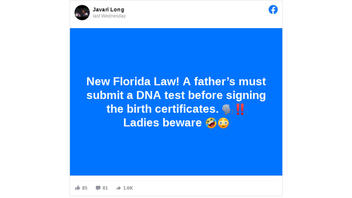
Is there a new Florida law that says fathers must submit a DNA test before signing a birth certificate? No, that's not true: Florida law "does not require a DNA test prior to signing a birth certificate," a legal expert told Lead Stories.
The claim appeared as a post (archived here) on Facebook on August 30, 2023. It opened:
New Florida Law! A father's must submit a DNA test before signing the birth certificates. 🗣️‼️
Ladies beware 🤣😳
This is what the post looked like on Facebook at the time of writing:
(Source: Facebook screenshot taken on Tue Sep 5 20:39:39 2023 UTC)
Elizabeth D. Katz, professor of law at the University of Florida Levin College of Law and visiting professor of law at Harvard Law School, told Lead Stories via email on September 5, 2023, that the claim that fathers must submit to a DNA test before signing a birth certificate is false:
Florida law does not require a DNA test prior to signing a birth certificate.
According to online law information site HG.org, establishing paternity in Florida is not automatically done when a birth certificate is signed:
In Florida, the law assumes that when a child is born to a married woman, the father is the husband. If she is unmarried when the child is born, paternity has to be established either by way of a court order or voluntarily. Legally speaking, having a name on a birth certificate does not establish paternity.
Katz further explained how paternity is established if a couple is not married at the time of birth of the child:
When an unmarried woman gives birth to a child, the putative father may sign an acknowledgment of paternity to assume the responsibilities of parenthood. Alternatively, paternity can be established through a court proceeding, which may include genetic testing.
The Florida Department of Revenue, which is responsible for child support in the state, explains paternity establishment on the website:
If the mother and father are not married when the child is born, the child's father can fill out and sign the Paternity Acknowledgment form (also called the DH-511) in the hospital. Both parents must fill out and sign the form in the presence of a notary public provided by the hospital. This is the quickest and easiest way to establish paternity when the mother and father are not married.
The man that signs the DH-511 form is the legal father as soon as the form is complete. The hospital will send the form to the Florida Bureau of Vital Statistics so they can record the birth. The legal father's name will also be on the birth certificate when it is recorded. Note: This option cannot be used if the mother is married when the child is born.
A search of Florida legislation that was passed in 2023 does not yield any results of bills regarding DNA and birth certificates.


















